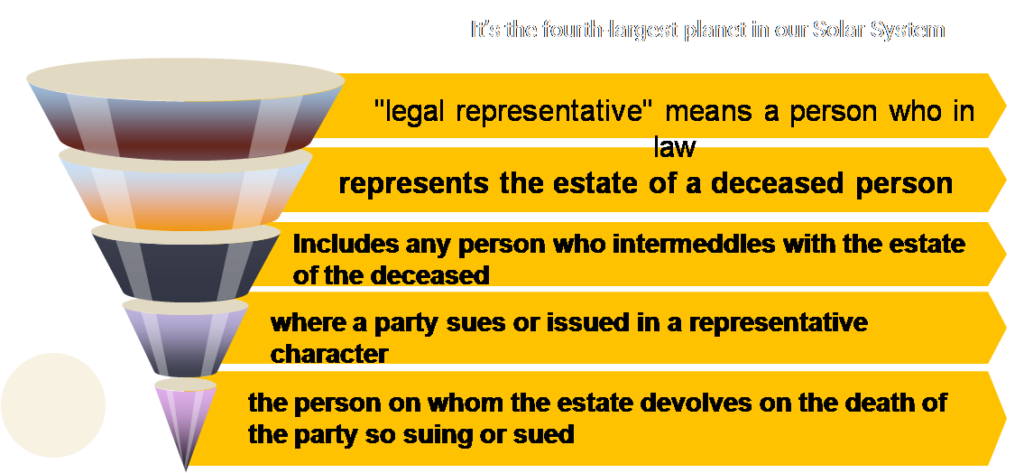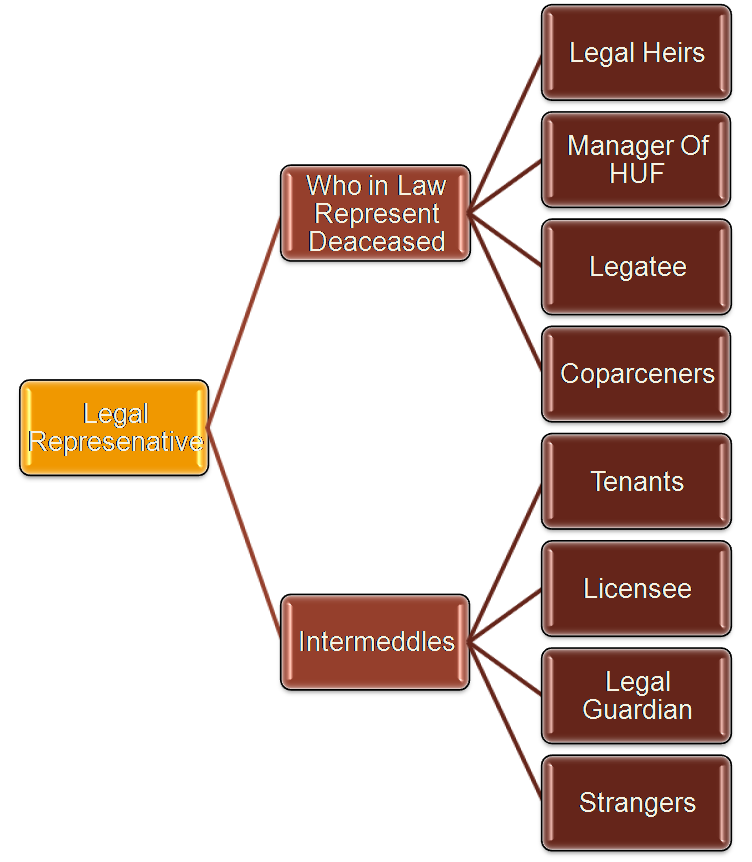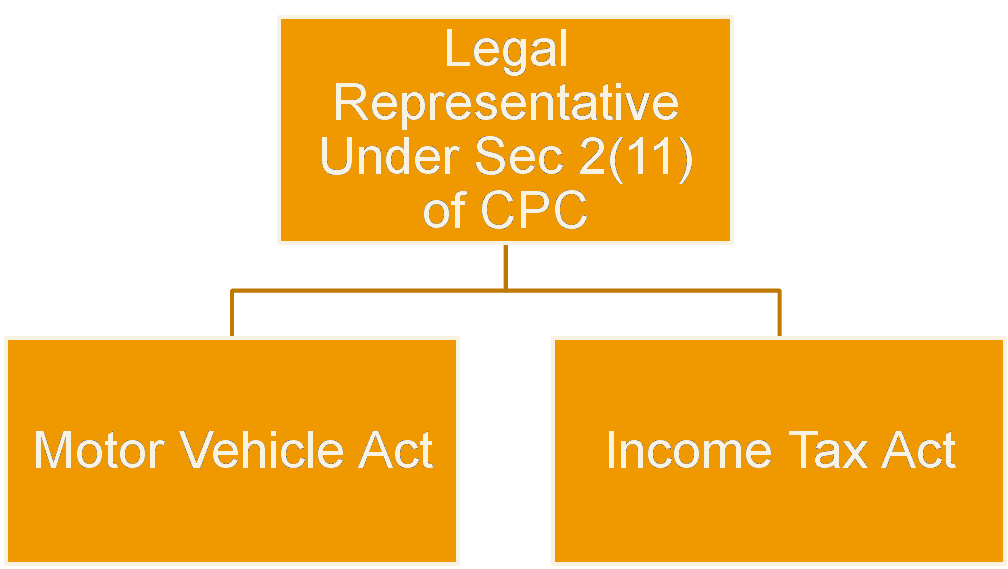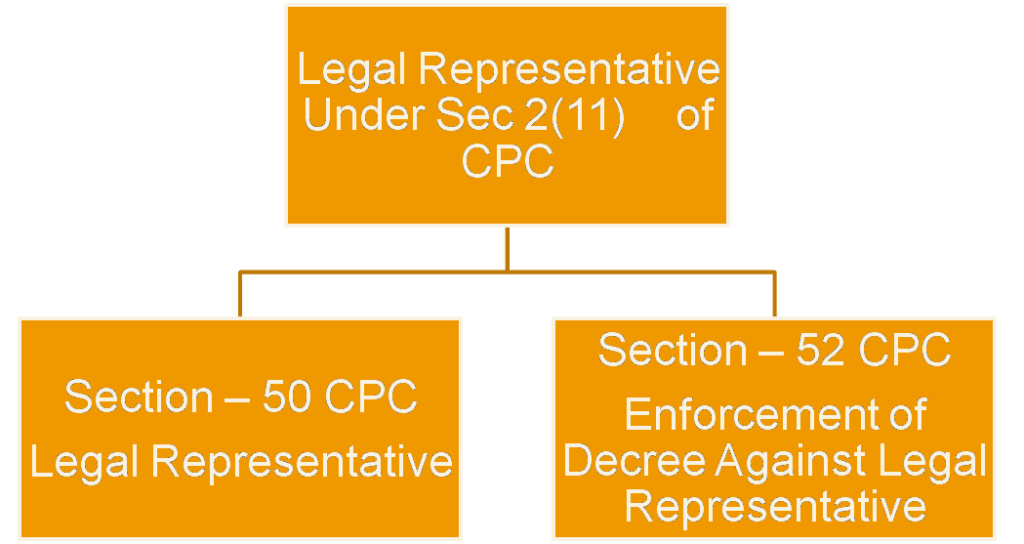LEGAL REPRESENTATIVE
Section- 2(11) of CPC 1908
Decree: Section 2(11) of the Code of Civil Procedure defines Legal Representative as follows:-
“legal representative” means a person who in law represents the estate of a deceased person, and includes any person who intermeddles with the estate of the deceased and where a party sues or issued in a representative character the person on whom the estate devolves on the death of the party so suing or sued;
Essentials Of Legal Represenatative

Legal representative is Genus and
legal heirs is Species
Supreme Court in the case of Custodian of Branches of BANCO National Ultramarino vs. Nalini Bai Naique
A ‘legal representative’ as defined in Civil Proce- dure Code means a person who in law represents the estate of a deceased person, and includes any person who intermeddles with the estate of the deceased and where a party sues or is sued in representative character the person on whom the estate devolves on the death of the party so suing or sued. The definition is inclusive in character and its scope is wide, it is not confined to legal heirs only instead it stipulates a person who may or may not be heir, competent to inherit the property of the deceased but he should represent the estate of the deceased person. It includes heirs as well as persons who represent the estate even without title either as executors or administrators in possession of the estate of the deceased. All such persons would be covered by the expression ‘legal representative’. If there are any heirs, those in possession bona fide, without there being any fraud or collusion, are also entitled to represent the estate of the deceased.

The definition of Legal Representative is a wide and inclusive one and conceives of two distinct categories. Firstly, the heirs or persons, who in law represent the estate of the deceased person. However, at par with them and in a class by itself is any person who intermeddles with the estate of the deceased. Such a person is equally a legal representative.
iNTERMEDDLE
Patna High Court Held In the Case of Sudama Devi And Ors. vs Jogendra Choudhary And Ors. on 29 September, 1986
Now the phrase intermeddler with the estate has come to be a term of art and has been construed as one of the widest amplitude. This apart, even the dictionary meaning of the word is one of considerable width. In Chambers’s Twentieth Century Dictionary the word ‘meddle’ is given the meaning to “interfere unnecessarily, or, without being entitled”. Intermeddle is “to meddle or to interfere improperly“
This word has also been the subject matter of considerable judicial scrutiny both in Indian and English laws. In Mst. Naro v. Harbanslal AIR 1962 Punj 457 Tek Chand, J., speaking for the Division Bench, observed as under : —
“Intermeddling means to meddle with the affairs of others in which one has no concern, to meddle officious; to interpose or interfere improperly. It signifies meddling with the property of another improperly. Intermeddling may take several forms including collecting or taking possession of the assets or other act, which might evince a legal control.
A legal person, who intermeddles, is on the same footing as an executor de son tort (executor of his own wrong) as he takes upon himself the office of an executor by intrusion and not so constituted by the testator. He is a person who without authority intermeddles with the estate of the deceased. Very slight act of intermeddling with the property of the deceased makes a person executor de son tort….
There is authority for the proposition that when a person intermeddles with the property of the deceased he is a legal representative of the deceased for the purposes of procedure to the extent of the property with which he has intermeddled….“
It would be manifest from the above that an intermeddler is one who in any way whatsoever dabbles with or comes in touch with the estate of the deceased. The wide sweep of the phrase, as a term of art, and the intention of the legislature in expressly including an intermeddler in the definition of legal representatives under Section 2(11) of the Civil P.C. is thus not in doubt.
Limitations ON iNTERMEDDLE
The term ‘intermeddle’ has been wisely used to exclude trespassers from the ambit of Legal Representatives and has been done deliberately such that procedural law (Civil Procedure Code, 1908) does not override the substantial law ( Transfer of Property Act, 1882 and Indian Penal Code, 1860) which makes the act of trespassing illegal. Procedural law must always be harmonious to substantial law but not have an overriding effect. A person said to intermeddle with the property, as against a trespasser, has some title over the estate of the deceased, although he does not hold the right to inherit the property. Tenants and licensee are included under intermeddlers.
In the case of Satya Ranjan Roy Choudhary and Anr. vs. Sarat Chandra Biswas (AIR 1926 Cal 825), The Court, pointed out exceptions to the rule where a trespasser can be considered as a legal representative:
If there are no other claimants over the estate of the deceased apart from him
If the said trespasser has a bonafide intention to represent the estate of the deceased in litigation;
5this intention is subjected to be proven on case-to-case basis and leaves the decision to the court’s discretion.










No comment